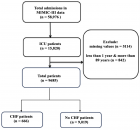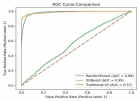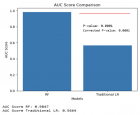Abstract
Research Article
Developing a Machine Learning Algorithm for Improved Management of Congestive Heart Failure Patients in the Emergency Department
Karamo Bah*, Amadou Wurry Jallow, Adama Ns Bah and Musa Touray
Published: 24 October, 2023 | Volume 8 - Issue 3 | Pages: 142-151
Background and aim: Congestive heart failure is a prevalent and serious condition that poses significant challenges in the emergency department setting. Prompt and accurate management of congestive heart failure patients is crucial for improving outcomes and optimizing resource utilization. This study aims to address these challenges by developing a machine learning algorithm and comparing it to a traditional logistic regression model that can assist in the triage, resource allocation, and long-term prognostication of congestive heart failure patients.
Methods: In this investigation, we used the MIMIC-III database, a publicly accessible resource containing patient data from ICU settings. Traditional logistic regression, along with the robust XGBoost and random forest algorithms, was harnessed to construct predictive models. These models were built using a range of pretreatment clinical variables. To pinpoint the most pertinent features, we carried out a univariate analysis. Ensuring robust performance and broad applicability, we adopted a nested cross-validation approach. This method enhances the precision and validation of our models by implementing multiple cross-validation iterations.
Results: The performance of machine learning algorithms was assessed using the area under the receiver operating characteristic curve (AUC). Notably, the random forest algorithm, despite having lower performance among the machine learning models still demonstrated significantly higher AUC than traditional logistic regression. The AUC for the XGBoost was 0.99, random forest 0.98, while traditional logistic regression was 0.57. The most important pretreatment variables associated with congestive heart failure include total bilirubin, creatine kinase, international normalized ratio (INR), sodium, age, creatinine, potassium, gender, alkaline phosphatase, and platelets.
Conclusion: Machine learning techniques utilizing multiple pretreatment clinical variables outperform traditional logistic regression in aiding the triage, resource allocation, and long-term prognostication of congestive heart failure patients in the intensive care unit setting using MIMIC III data.
Read Full Article HTML DOI: 10.29328/journal.jccm.1001167 Cite this Article Read Full Article PDF
Keywords:
Congestive heart failure; Triage; Prognostication; Prediction; Resource allocation; Machine learning
References
- Benjamin EJ, Blaha MJ, Chiuve SE, Cushman M, Das SR, Deo R, de Ferranti SD, Floyd J, Fornage M, Gillespie C, Isasi CR, Jiménez MC, Jordan LC, Judd SE, Lackland D, Lichtman JH, Lisabeth L, Liu S, Longenecker CT, et al. American Heart Association Statistics Committee and Stroke Statistics Subcommittee. Heart Disease and Stroke Statistics-2017 Update: A Report From the American Heart Association. Circulation. 2017 Mar 7;135(10):e146-e603. doi: 10.1161/CIR.0000000000000485. Epub 2017 Jan 25. Erratum in: Circulation. 2017 Mar 7;135(10 ):e646. Erratum in: Circulation. 2017 Sep 5;136(10 ):e196. PMID: 28122885; PMCID: PMC5408160.
- Braunwald E, Bristow MR. Congestive heart failure: fifty years of progress. Circulation. 2000 Nov 14;102(20 Suppl 4):IV14-23. doi: 10.1161/01.cir.102.suppl_4.iv-14. PMID: 11080127.
- Averbuch T, Lee SF, Mamas MA, Oz UE, Perez R, Connolly SJ, Ko DT, Van Spall HGC. Derivation and validation of a two-variable index to predict 30-day outcomes following heart failure hospitalization. ESC Heart Fail. 2021 Aug;8(4):2690-2697. doi: 10.1002/ehf2.13324. Epub 2021 May 1. PMID: 33932113; PMCID: PMC8318488.
- Averbuch T, Sullivan K, Sauer A, Mamas MA, Voors AA, Gale CP, Metra M, Ravindra N, Van Spall HGC. Applications of artificial intelligence and machine learning in heart failure. Eur Heart J Digit Health. 2022 May 13;3(2):311-322. doi: 10.1093/ehjdh/ztac025. PMID: 36713018; PMCID: PMC9707916.
- Cook JA, Collins GS. The rise of big clinical databases. Br J Surg. 2015 Jan;102(2):e93-e101. doi: 10.1002/bjs.9723. PMID: 25627139.
- Alaskar H, Saba T. Machine learning and deep learning: a comparative review. Proceedings of Integrated Intelligence Enable Networks and Computing: IIENC 2020. 2021; 143-150.
- Ayodele TO. Machine learning overview. New Advances in Machine Learning. 2010; 2: 9-18.
- Lim YMF, Molnar M, Vaartjes I, Savarese G, Eijkemans MJC, Uijl A, Vradi E, Suzart-Woischnik K, Brugts JJ, Brunner-La Rocca HP, Blanc-Guillemaud V, Couvelard F, Baudier C, Dyszynski T, Waechter S, Lund LH, Hoes AW, Tyl B, Asselbergs FW, Gerlinger C, Grobbee DE, Cronin M, Koudstaal S. Generalizability of randomized controlled trials in heart failure with reduced ejection fraction. Eur Heart J Qual Care Clin Outcomes. 2022 Oct 26;8(7):761-769. doi: 10.1093/ehjqcco/qcab070. PMID: 34596659; PMCID: PMC9603541.
- Gulati G, Upshaw J, Wessler BS, Brazil RJ, Nelson J, van Klaveren D, Lundquist CM, Park JG, McGinnes H, Steyerberg EW, Van Calster B, Kent DM. Generalizability of Cardiovascular Disease Clinical Prediction Models: 158 Independent External Validations of 104 Unique Models. Circ Cardiovasc Qual Outcomes. 2022 Apr;15(4):e008487. doi: 10.1161/CIRCOUTCOMES.121.008487. Epub 2022 Mar 31. PMID: 35354282; PMCID: PMC9015037.
- Cowie MR, Blomster JI, Curtis LH, Duclaux S, Ford I, Fritz F, Goldman S, Janmohamed S, Kreuzer J, Leenay M, Michel A, Ong S, Pell JP, Southworth MR, Stough WG, Thoenes M, Zannad F, Zalewski A. Electronic health records to facilitate clinical research. Clin Res Cardiol. 2017 Jan;106(1):1-9. doi: 10.1007/s00392-016-1025-6. Epub 2016 Aug 24. PMID: 27557678; PMCID: PMC5226988.
- Weissler EH, Naumann T, Andersson T, Ranganath R, Elemento O, Luo Y, Freitag DF, Benoit J, Hughes MC, Khan F, Slater P, Shameer K, Roe M, Hutchison E, Kollins SH, Broedl U, Meng Z, Wong JL, Curtis L, Huang E, Ghassemi M. The role of machine learning in clinical research: transforming the future of evidence generation. Trials. 2021 Aug 16;22(1):537. doi: 10.1186/s13063-021-05489-x. Erratum in: Trials. 2021 Sep 6;22(1):593. PMID: 34399832; PMCID: PMC8365941.
- Johnson AE, Pollard TJ, Shen L, Lehman LW, Feng M, Ghassemi M, Moody B, Szolovits P, Celi LA, Mark RG. MIMIC-III, a freely accessible critical care database. Sci Data. 2016 May 24;3:160035. doi: 10.1038/sdata.2016.35. PMID: 27219127; PMCID: PMC4878278.
- Stekhoven DJ, Bühlmann P. MissForest--non-parametric missing value imputation for mixed-type data. Bioinformatics. 2012 Jan 1;28(1):112-8. doi: 10.1093/bioinformatics/btr597. Epub 2011 Oct 28. PMID: 22039212.
- Ahad NA, Yin TS, Othman AR, Yaacob CR. Sensitivity of normality tests to non-normal data. Sains Malaysiana. 2011; 40(6): 637-641.
- Kaiser J. Dealing with Missing Values in Data. Journal Of Systems Integration. 2014; (1804-2724): 5(1).
- van der Heijden GJ, Donders AR, Stijnen T, Moons KG. Imputation of missing values is superior to complete case analysis and the missing-indicator method in multivariable diagnostic research: a clinical example. J Clin Epidemiol. 2006 Oct;59(10):1102-9. doi: 10.1016/j.jclinepi.2006.01.015. Epub 2006 Jul 11. PMID: 16980151.
- Xi Y, Wang H, Sun N. Machine learning outperforms traditional logistic regression and offers new possibilities for cardiovascular risk prediction: A study involving 143,043 Chinese patients with hypertension. Front Cardiovasc Med. 2022 Nov 14;9:1025705. doi: 10.3389/fcvm.2022.1025705. PMID: 36451926; PMCID: PMC9701715.
- Menard S. Standards for standardized logistic regression coefficients. Social Forces. 2011; 89(4): 1409-1428.
- Sarker IH, Furhad MH, Nowrozy R. Ai-driven cybersecurity: an overview, security intelligence modeling, and research directions. SN Computer Science. 2021; 2: 1-18.
- Chen T, He T, Benesty M, Khotilovich V, Tang Y, Cho H, Zhou T. Xgboost: extreme gradient boosting. R package version 0. 2015;4-2: 1(4); 1-4.
- Liu Y, Wang Y, Zhang J. New machine learning algorithm: Random forest. Paper presented at the Information Computing and Applications: Third International Conference, ICICA 2012, Chengde, China, September 14-16, 2012. Proceedings 3.
- Liu S, Yang B, Wang Y, Tian J, Yin L, Zheng W. 2D/3D multimode medical image registration based on normalized cross-correlation. Applied Sciences. 2022; 12(6): 2828.
- Breiman L. Random forests. Machine learning. 2001; 45: 5-32.
- Mishra VN, Kumar V, Prasad R, Punia M. Geographically weighted method integrated with logistic regression for analyzing spatially varying accuracy measures of remote sensing image classification. Journal of the Indian Society of Remote Sensing. 2021; 49: 1189-1199.
- Wilson JR, Lorenz KA, Wilson JR, Lorenz KA. Standard binary logistic regression model. Modeling binary correlated responses using SAS, SPSS, and R. 2015; 25-54.
- Nishi H, Oishi N, Ishii A, Ono I, Ogura T, Sunohara T, Chihara H, Fukumitsu R, Okawa M, Yamana N, Imamura H, Sadamasa N, Hatano T, Nakahara I, Sakai N, Miyamoto S. Predicting Clinical Outcomes of Large Vessel Occlusion Before Mechanical Thrombectomy Using Machine Learning. Stroke. 2019 Sep;50(9):2379-2388. doi: 10.1161/STROKEAHA.119.025411. Epub 2019 Aug 14. PMID: 31409267.
- Abedi V, Goyal N, Tsivgoulis G, Hosseinichimeh N, Hontecillas R, Bassaganya-Riera J, Elijovich L, Metter JE, Alexandrov AW, Liebeskind DS, Alexandrov AV, Zand R. Novel Screening Tool for Stroke Using Artificial Neural Network. Stroke. 2017 Jun;48(6):1678-1681. doi: 10.1161/STROKEAHA.117.017033. Epub 2017 Apr 24. PMID: 28438906.
- van Os HJA, Ramos LA, Hilbert A, van Leeuwen M, van Walderveen MAA, Kruyt ND, Dippel DWJ, Steyerberg EW, van der Schaaf IC, Lingsma HF, Schonewille WJ, Majoie CBLM, Olabarriaga SD, Zwinderman KH, Venema E, Marquering HA, Wermer MJH; MR CLEAN Registry Investigators. Predicting Outcome of Endovascular Treatment for Acute Ischemic Stroke: Potential Value of Machine Learning Algorithms. Front Neurol. 2018 Sep 25;9:784. doi: 10.3389/fneur.2018.00784. PMID: 30319525; PMCID: PMC6167479.
- Ceresoli M, Nespoli L. Analyzing Continuous Variables: Descriptive Statistics, Dispersion and Comparison. In Statistics and Research Methods for Acute Care and General Surgeons. 2022; 55-66. Springer.
- Lee S, Lee DK. What is the proper way to apply the multiple comparison test? Korean J Anesthesiol. 2018 Oct;71(5):353-360. doi: 10.4097/kja.d.18.00242. Epub 2018 Aug 28. Erratum in: Korean J Anesthesiol. 2020 Dec;73(6):572. PMID: 30157585; PMCID: PMC6193594.
- Papoutsoglou G, Tarazona S, Lopes MB, Klammsteiner T, Ibrahimi E, Eckenberger J, Novielli P, Tonda A, Simeon A, Shigdel R, Béreux S, Vitali G, Tangaro S, Lahti L, Temko A, Claesson MJ, Berland M. Machine learning approaches in microbiome research: challenges and best practices. Front Microbiol. 2023 Sep 22;14:1261889. doi: 10.3389/fmicb.2023.1261889. PMID: 37808286; PMCID: PMC10556866.
- Antoniades C, Tousoulis D, Koumallos N, Marinou K, Stefanadis C. Levosimendan: beyond its simple inotropic effect in heart failure. Pharmacol Ther. 2007 May;114(2):184-97. doi: 10.1016/j.pharmthera.2007.01.008. Epub 2007 Feb 16. PMID: 17363065.
- Cuthbert JJ, Pellicori P, Rigby A, Pan D, Kazmi S, Shah P, Clark AL. Low serum chloride in patients with chronic heart failure: clinical associations and prognostic significance. Eur J Heart Fail. 2018 Oct;20(10):1426-1435. doi: 10.1002/ejhf.1247. Epub 2018 Jun 26. PMID: 29943886.
- Shinagawa H, Inomata T, Koitabashi T, Nakano H, Takeuchi I, Naruke T, Ohsaka T, Nishii M, Takehana H, Izumi T. Prognostic significance of increased serum bilirubin levels coincident with cardiac decompensation in chronic heart failure. Circ J. 2008 Mar;72(3):364-9. doi: 10.1253/circj.72.364. PMID: 18296830.
- Barale C, Russo I. Influence of Cardiometabolic Risk Factors on Platelet Function. Int J Mol Sci. 2020 Jan 17;21(2):623. doi: 10.3390/ijms21020623. PMID: 31963572; PMCID: PMC7014042.
- Demirkol S, Balta S, Unlu M, Yuksel UC, Celik T, Arslan Z, Kucuk U, Yokusoglu M. Evaluation of the mean platelet volume in patients with cardiac syndrome X. Clinics (Sao Paulo). 2012 Sep;67(9):1019-22. doi: 10.6061/clinics/2012(09)06. PMID: 23018297; PMCID: PMC3438240.
- Grieve DJ, Cassidy RS, Green BD. Emerging cardiovascular actions of the incretin hormone glucagon-like peptide-1: potential therapeutic benefits beyond glycaemic control? Br J Pharmacol. 2009 Aug;157(8):1340-51. doi: 10.1111/j.1476-5381.2009.00376.x. PMID: 19681866; PMCID: PMC2765323.
- Crimmins EM, Shim H, Zhang YS, Kim JK. Differences between Men and Women in Mortality and the Health Dimensions of the Morbidity Process. Clin Chem. 2019 Jan;65(1):135-145. doi: 10.1373/clinchem.2018.288332. Epub 2018 Nov 26. PMID: 30478135; PMCID: PMC6345642.
- Lakatta EG. Arterial and cardiac aging: major shareholders in cardiovascular disease enterprises: Part III: cellular and molecular clues to heart and arterial aging. Circulation. 2003 Jan 28;107(3):490-7. doi: 10.1161/01.cir.0000048894.99865.02. PMID: 12551876.
- Kannel WB. Incidence and epidemiology of heart failure. Heart Fail Rev. 2000 Jun;5(2):167-73. doi: 10.1023/A:1009884820941. PMID: 16228142.
- Masoudi FA, Havranek EP, Smith G, Fish RH, Steiner JF, Ordin DL, Krumholz HM. Gender, age, and heart failure with preserved left ventricular systolic function. J Am Coll Cardiol. 2003 Jan 15;41(2):217-23. doi: 10.1016/s0735-1097(02)02696-7. PMID: 12535812.
- Sharma A, Zhao X, Hammill BG, Hernandez AF, Fonarow GC, Felker GM, Yancy CW, Heidenreich PA, Ezekowitz JA, DeVore AD. Trends in Noncardiovascular Comorbidities Among Patients Hospitalized for Heart Failure: Insights From the Get With The Guidelines-Heart Failure Registry. Circ Heart Fail. 2018 Jun;11(6):e004646. doi: 10.1161/CIRCHEARTFAILURE.117.004646. PMID: 29793934.
- Messerli FH, Rimoldi SF, Bangalore S. The Transition From Hypertension to Heart Failure: Contemporary Update. JACC Heart Fail. 2017 Aug;5(8):543-551. doi: 10.1016/j.jchf.2017.04.012. Epub 2017 Jul 12. Erratum in: JACC Heart Fail. 2017 Dec;5(12 ):948. PMID: 28711447.
- Saupe KW, Spindler M, Tian R, Ingwall JS. Impaired cardiac energetics in mice lacking muscle-specific isoenzymes of creatine kinase. Circ Res. 1998 May 4;82(8):898-907. doi: 10.1161/01.res.82.8.898. PMID: 9576109.
- Ingwall JS, Weiss RG. Is the failing heart energy starved? On using chemical energy to support cardiac function. Circ Res. 2004 Jul 23;95(2):135-45. doi: 10.1161/01.RES.0000137170.41939.d9. PMID: 15271865.
Figures:

Figure 1

Figure 2

Figure 3

Figure 4
Similar Articles
-
Value of electrocardiographic T wave inversion in lead aVL in prediction of Mid Left Anterior Descending Stenosis in patients with stable Coronary Artery diseaseGehan Magdy*,Awad Yousef. Value of electrocardiographic T wave inversion in lead aVL in prediction of Mid Left Anterior Descending Stenosis in patients with stable Coronary Artery disease. . 2017 doi: 10.29328/journal.jccm.1001015; 2: 056-062
-
Diagnostic accuracy of TIMI versus GRACE score for prediction of death in patients presenting with Acute Non-ST Elevation Myocardial Infarction (NSTEMI)Syed Haseeb Raza Naqvi,Tariq Abbas,Han Naung Tun*,Ali Ahmad Naqvi,Zubair Zaffar,Badar ul Ahad Gill,Nisar Ahmad. Diagnostic accuracy of TIMI versus GRACE score for prediction of death in patients presenting with Acute Non-ST Elevation Myocardial Infarction (NSTEMI). . 2019 doi: 10.29328/journal.jccm.1001032; 4: 001-005
-
Role of novel cardiac biomarkers for the diagnosis, risk stratification, and prognostication among patients with heart failureJennifer Miao,Joel Estis,Yan Ru Su,John A Todd,Daniel J Lenihan*. Role of novel cardiac biomarkers for the diagnosis, risk stratification, and prognostication among patients with heart failure. . 2019 doi: 10.29328/journal.jccm.1001049; 4: 103-109
-
A Systematic review for sudden cardiac death in hypertrophic cardiomyopathy patients with Myocardial Fibrosis: A CMR LGE StudySahadev T Reddy,Antonio T Paladino,Nackle J Silva,Mark Doyle,Diane A Vido,Robert WW Biederman*. A Systematic review for sudden cardiac death in hypertrophic cardiomyopathy patients with Myocardial Fibrosis: A CMR LGE Study. . 2019 doi: 10.29328/journal.jccm.1001064; 4: 187-191
-
Left ventricular ejection fraction and contrast induced acute kidney injury in patients undergoing cardiac catheterization: Results of retrospective chart reviewFiras Ajam*,Obiora Maludum,Nene Ugoeke,Hetavi Mahida,Anas Alrefaee,Amy Quinlan DNP,Jennifer Heck-Kanellidis NP,Dawn Calderon DO,Mohammad A Hossain*,Arif Asif. Left ventricular ejection fraction and contrast induced acute kidney injury in patients undergoing cardiac catheterization: Results of retrospective chart review. . 2019 doi: 10.29328/journal.jccm.1001066; 4: 195-198
-
Pathological left ventricular hypertrophy and outflow tract obstruction in an infant of a diabetic mother: A case reportUjuanbi AS*,Onyeka CA,Yeibake WS, Oremodu T,Kunle-Olowu OE,Otaigbe BE. Pathological left ventricular hypertrophy and outflow tract obstruction in an infant of a diabetic mother: A case report. . 2020 doi: 10.29328/journal.jccm.1001085; 5: 047-050
-
Security and performance of remote patient monitoring for chronic heart failure with Satelia® Cardio: First results from real-world usePatrick Jourdain*, F Picard, N Girerd, H Lemieux, F Barritault, MF Seronde, JP Labarre, N Pages, C Bedel, L Betito, S Nisse-Durgeat, B Diebold. Security and performance of remote patient monitoring for chronic heart failure with Satelia® Cardio: First results from real-world use. . 2023 doi: 10.29328/journal.jccm.1001152; 8: 042-050
-
Noninvasive Cuffless Blood Pressure Monitoring. How Mechanism-Driven and Data-Driven Models Can Help in Clinical PracticeMohamed Zaid*, Mihail Popescu, Laurel Despins, James Keller, Marjorie Skubic, Giovanna Guidoboni. Noninvasive Cuffless Blood Pressure Monitoring. How Mechanism-Driven and Data-Driven Models Can Help in Clinical Practice. . 2023 doi: 10.29328/journal.jccm.1001157; 8: 081-085
-
Developing a Machine Learning Algorithm for Improved Management of Congestive Heart Failure Patients in the Emergency DepartmentKaramo Bah*, Amadou Wurry Jallow, Adama Ns Bah, Musa Touray. Developing a Machine Learning Algorithm for Improved Management of Congestive Heart Failure Patients in the Emergency Department. . 2023 doi: 10.29328/journal.jccm.1001167; 8: 142-151
-
Value of Speckle Tracking Echocardiography in Prediction of Left Ventricular Reverse Remodeling in Patients with Chronic total Occlusion Undergoing Percutaneous Coronary InterventionsGehan Magdy*, Sahar Hamdy Azab, Yasmin Ali Esmail, Mohamed Khalid Elfaky. Value of Speckle Tracking Echocardiography in Prediction of Left Ventricular Reverse Remodeling in Patients with Chronic total Occlusion Undergoing Percutaneous Coronary Interventions. . 2023 doi: 10.29328/journal.jccm.1001170; 8: 164-170
Recently Viewed
-
Trends in TeledentistryRudrakshi C*. Trends in Teledentistry. J Clin Adv Dent. 2020: doi: 10.29328/journal.jcad.1001014; 4: 004-005
-
Au26-35: A Special Geometrical Structure of Au33 (D2) Cluster with Highly Occupied - 14 Pairs of Double-State DegeneracyK Vishwanathan*. Au26-35: A Special Geometrical Structure of Au33 (D2) Cluster with Highly Occupied - 14 Pairs of Double-State Degeneracy. Ann Adv Chem. 2022: doi: 10.29328/journal.aac.1001035; 6: 063-080
-
Texture of Thin Films of Aluminum Nitride Produced by Magnetron SputteringStrunin Vladimir Ivanovich,Baranova Larisa Vasilievna*,Baisova Bibigul Tulegenovna. Texture of Thin Films of Aluminum Nitride Produced by Magnetron Sputtering. Int J Phys Res Appl. 2025: doi: 10.29328/journal.ijpra.1001106; 8: 013-016
-
Minimising Carbon Footprint in Anaesthesia PracticeNisha Gandhi and Abinav Sarvesh SPS*. Minimising Carbon Footprint in Anaesthesia Practice. Int J Clin Anesth Res. 2024: doi: 10.29328/journal.ijcar.1001025; 8: 005-007
-
On Friedman equation, quadratic laws and the geometry of our universeS Kalimuthu*. On Friedman equation, quadratic laws and the geometry of our universe. Int J Phys Res Appl. 2021: doi: 10.29328/journal.ijpra.1001041; 4: 048-050
Most Viewed
-
Evaluation of Biostimulants Based on Recovered Protein Hydrolysates from Animal By-products as Plant Growth EnhancersH Pérez-Aguilar*, M Lacruz-Asaro, F Arán-Ais. Evaluation of Biostimulants Based on Recovered Protein Hydrolysates from Animal By-products as Plant Growth Enhancers. J Plant Sci Phytopathol. 2023 doi: 10.29328/journal.jpsp.1001104; 7: 042-047
-
Sinonasal Myxoma Extending into the Orbit in a 4-Year Old: A Case PresentationJulian A Purrinos*, Ramzi Younis. Sinonasal Myxoma Extending into the Orbit in a 4-Year Old: A Case Presentation. Arch Case Rep. 2024 doi: 10.29328/journal.acr.1001099; 8: 075-077
-
Feasibility study of magnetic sensing for detecting single-neuron action potentialsDenis Tonini,Kai Wu,Renata Saha,Jian-Ping Wang*. Feasibility study of magnetic sensing for detecting single-neuron action potentials. Ann Biomed Sci Eng. 2022 doi: 10.29328/journal.abse.1001018; 6: 019-029
-
Pediatric Dysgerminoma: Unveiling a Rare Ovarian TumorFaten Limaiem*, Khalil Saffar, Ahmed Halouani. Pediatric Dysgerminoma: Unveiling a Rare Ovarian Tumor. Arch Case Rep. 2024 doi: 10.29328/journal.acr.1001087; 8: 010-013
-
Physical activity can change the physiological and psychological circumstances during COVID-19 pandemic: A narrative reviewKhashayar Maroufi*. Physical activity can change the physiological and psychological circumstances during COVID-19 pandemic: A narrative review. J Sports Med Ther. 2021 doi: 10.29328/journal.jsmt.1001051; 6: 001-007

HSPI: We're glad you're here. Please click "create a new Query" if you are a new visitor to our website and need further information from us.
If you are already a member of our network and need to keep track of any developments regarding a question you have already submitted, click "take me to my Query."

















































































































































